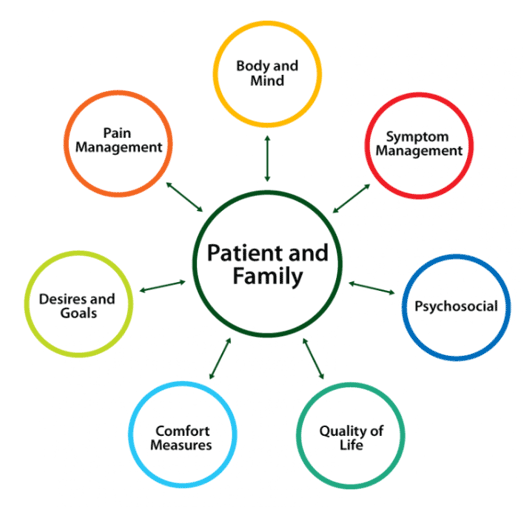Palliative Care
Palliative care is specialized medical care for people living with a serious illness. This type of care is focused on providing relief from the symptoms and stress of the illness. The goal is to improve quality of life for both the patient and the family.
Palliative care is provided by a specially-trained team of doctors, nurses and other specialists who work together with a patient’s other doctors to provide an extra layer of support. Palliative care is based on the needs of the patient, not on the Patient’s prognosis. It is appropriate at any age and at any stage in a serious illness, and it can be provided along with curative treatment.
Improves quality of life:
Palliative care teams focus on quality of life. They treat people suffering from the symptoms and stress of serious illnesses such as:
- Cancer
- Congestive heart failure ( CHF)
- Chronic obstructive pulmonary disease (COPD)
- Kidney disease
- Alzheimer’s
- Parkinson’s
- Amyotrophic Lateral Sclerosis (ALS) and many more.
Relieves Suffering from Symptoms and Stress:
The goal of Palliative care is to relieve suffering and provide the best possible quality of life for patients and their families. Symptoms may include:
- Pain
- Depression
- Shortness of breath
- Fatigue
- Constipation
- Nausea
- Loss of appetite
- Difficulty of sleeping
- And anxiety
Also Palliative care team will work with the patients to identify and carry out patient’s goals: symptom relief, counselling, spiritual comfort, or whatever enhances patient’s quality of life. Palliative care can also help patient to understand all of their treatment options.
As an experience Palliative care provider, we should obtain below given quality of services for patients:
Competency in palliative nursing
- Communication skills. A highly developed range of sensitive and facilitative communication skills is to be expected in nursing, but is not unique to a palliative setting. …
- Psycho-social skills
- Teamwork skills
- Physical care skills
- Life closure skills
- Interpersonal skills

What is the difference between Palliative Care and End-of-Life Care?
| PALLIATIVE CARE | END-OF-LIFE CARE |
| Living with a life-limiting illness with any prognosis | Ongoing medical treatments as appropriate |
| Symptom management | Hospice care / Home supports for Elderly |
| Maximizing quality of life | Weeks to months to live |
| Spiritual healthcare | Symptom management |
| Psychosocial support | Spiritual healthcare |
| Maximizing community supports | Psychosocial support |
Principles of palliative care
- Affirms life and regards dying as a normal process.
- Neither hastens nor postpones death.
- Provides relief from pain and other distressing symptoms.
- Integrates the psychological and spiritual aspects of care.
- Offers a support system to help patients live as actively as possible until death.

